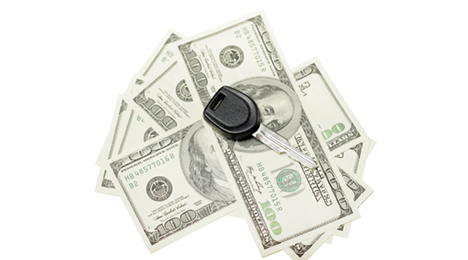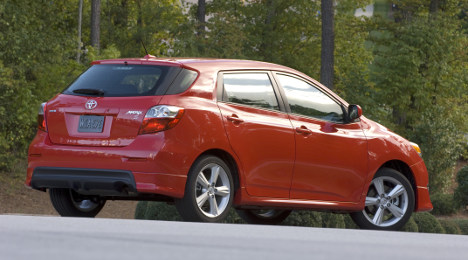The Ontario Motor Vehicle Industry Council announced this week after fielding numerous consumer complaints it has ordered the immediate suspension of two Sudbury dealerships.
The dealerships in question: Drivetime, located at 1088-B The Kingsway; and Craig Terry Investments Ltd., at 1092-B The Kingsway.
"Immediate suspensions are fairly dramatic steps," said Terry O'Keefe, OMVIC director of communications. "They are taken when OMVIC believes a dealer's conduct may place the car-buying public at risk".
The regulator also said it issued Proposals to Refuse the registrations of Micheline Cooper, operator of Drivetime and Craig Terry Investments Ltd., and of another dealership Cooper attempted to register — Turn Key Auto.
Under the suspension, neither dealership may legally sell, lease or buy vehicles. That said, the suspensions are temporary and subject to appeal to the Licence Appeal Tribunal. Proposals to Refuse are also appealable to LAT.
The regulator also pointed out there are other registered dealers in Ontario using the business name Drivetime and are in no way affiliated with Drivetime in Sudbury.
The announcement came on the heels of a warning OMVIC released for consumers earlier this week in regards to stolen vehicles and buying from unlicensed dealers, also known as curbsiders.
OMVIC reported two stolen SUVs were destroyed by Economical Insurance to prevent them from being sold whole or in parts to the public.
"We cannot be assured of the safety of the vehicles", said Javier Ibanez, vice-president of national sales and distribution for Economical. "Parts from other vehicles — salvage or otherwise — were put on these vehicles by individuals who were convicted as part of the February 2010 arrests."
The company believes the persons found in possession of the stolen SUVs were preparing to sell them to the public when the vehicles were recovered by police.
Prime Minister Stephen Harper’s announcement regarding a free-trade agreement between South Korea and Canada garnered a bit of a mixed review from the automotive industry and unions.
Unifor, one of Canada’s largest unions in the private sector, even went so far as to say the Canadian auto industry is “threatened” by the free-trade deal with South Korea.
"We cannot stand by a deal that secures a one-way flow of Korean auto imports into the Canadian market, undermining the jobs and industry on which so many Canadians depend, while precious little is done to strengthen our imports to Korea," said Unifor national president Jerry Dias.
Many automakers, including Ford of Canada, announced they oppose the agreement, as well.
A statement released from Dianne Craig, president and chief executive officer of Ford of Canada, voiced the company’s concern: “Over the last two years, both the United States and European Union free trade agreements with South Korea have failed to reverse this one-sided automotive trade flow because the South Korean government continues its long history of maintaining a closed market through non-tariff trade barriers and actively intervening in its currency to unfairly subsidize its exports and protect its home market.”
Interestingly, industry association the Global Automakers of Canada, on the other hand, encouraged the agreement and voiced positive predictions before the deal was penned.
"The Global Automakers of Canada supports all trade liberalizing agreements , EU, South Korea and Japan," said David Adams, president of the association. "With the imminent completion of these negotiations with South Korea, we expect that the Government of Canada will move expeditiously to finalize a Canada/Japan EPA, to level the playing field for all vehicle distributors in the Canadian market, which will create benefits for Canadian consumers.”
Prime Minister Harper announced the deal includes a three-year phased-in removal of Canadian auto tariffs on Korean vehicles and an immediate removal of Korean tariffs on Canadian exports.
According to the Canadian government, the Canada-Korea Free Trade Agreement is predicted to boost the Canadian economy by $1.7 billion and increase Canadian exports to South Korea by 32 percent.
Unifor voiced concerns that Canada wasn’t able to negotiate similar protections to the ones the United States negotiated in its free trade agreement with South Korea.
“The U.S. deal with South Korea included protections against import surges into the US market and a ground-breaking ‘snap-back’ provision which enables the US government to return tariffs to pre-agreement levels if Korean non-tariff barriers limit US exports,” Unifor officials explained. “Even with these provisions, the U.S. has suffered a worsening auto trade deficit.”
Unifor also contends Harper did not address the current trade imbalance.
“We needed our political leadership to broker a deal that addressed the reality that we have 100,000 Korean-made cars being imported to our market, while we are exporting only 100 cars to the Korean market," stressed Dias.
This week, the Canadian automotive industry had time to respond to the Canadian Government’s introduction of an improved test methodology for establishing fuel-consumption values, which will be used for new 2015 model-year vehicles — and the verdict is positive.
The Canadian Vehicle Manufacturer’s’ Association announced it supports the steps to improve vehicle fuel consumption ratings, noting it approves of the new test methodology being aligned with the existing U.S. Environmental Protection Association methods.
The government has updated the old two cycle test methodology to five cycle test methodology to measure fuel consumption of a vehicle, and it has introduced new five cycle fuel consumption values to the EnerGuide labels that appear on vehicles, beginning with the 2015 model year.
The Canadian Government will also continue to work on finalizing new labels that will provide additional helpful information for consumers beginning with the 2016 model year
"Not only is this a logical step for Canada, given our integrated sales market with the United States, and common vehicle emission standards between the two countries, but consumers will benefit from having new fuel consumption ratings that more closely reflect today's driving patterns," said Mark Nantais, president of the Canadian Vehicle Manufacturers Association.
The initiative includes new fuel-consumption ratings and labels for cars and trucks. The new labels will be put on 2015 model-year vehicles and will allow consumers to compare CO2 emissions when searching for a new car.
Federal Natural Resources Minister Joe Oliver explained the new ratings are designed to give consumers a more reliable gauge for a vehicle’s fuel efficiency by taking into account factors, including air conditioner use, winter weather, braking and rapid acceleration.
The government also announced it will be publishing a list of the most fuel-efficient vehicles this year, which will also include an online searchable database for consumers. The list can be found here.
The Global Automarkers of Canada also expressed their support for the announcement.
"We commend the government for moving to this change in test methodology, which simply means that the fuel consumption values shown on the label of 2015 model-year vehicles will be a more accurate reflection of the amount of fuel that the vehicle actually consumes. This change typically means that 2015 model-year vehicles will have labels that show greater fuel consumption than a similar 2014 model-year vehicle," said David Adams, president of the Global Automakers of Canada.
"Employing a test methodology that provides the car buying public with a more accurate picture of the estimated fuel consumption of all vehicles is important in ensuring that customers have all of the relevant information in hand when the time comes to purchase a new vehicle, especially those consumers for whom fuel-efficiency is one of the factors influencing the type of vehicle they end up purchasing," he continued.
The association also cautioned that as some model-year 2015 vehicles are entering the marketplace starting this month, "it is extremely important for consumers to understand the difference between 2014 label values that reflect the old two cycle test methodology, and the new five cycle testing methodology reflected on the label value of a 2015 model year vehicle."
Many high-end vehicle dealers in Canada are breathing a sigh of relief as Canadian and U.S. law enforcement agencies cracked down on an international vehicle theft crime ring, recovering $3.2 million in assets.
Car recovery company LoJack Corp. reported its part in the recent bust, providing insight into the international crime ring investigation titled “Project Windows.”
The project was formed in October 2012 to investigate a criminal organization which allegedly used fake IDs to steal cars and ship them to Africa.
The operation included collaborative efforts between Canadian law enforcement, United States Homeland Security and Canadian Border Services, who each played a role in tracking the group of criminals responsible for stealing more than $5.4 million in vehicles as part of an organized crime ring, according to the report.
How did the theft and trafficking work?
The criminals stole from high-end vehicle dealerships in Canada using falsified documents and fraudulent identities and transported them across the border to United States ports including Newark, N.J., and Baltimore.
But the vehicles didn’t stop there; they were then placed in cargo containers and shipped overseas to Nigeria and Ghana.
LoJack’s help was enlisted by the York Regional Police, and the company provided several covert vehicle tracking devices to law enforcement that were placed inside some of the high-end vehicles stolen by the theft ring or being utilized for criminal activities.
“The LoJack devices helped investigators gather intelligence on the suspects and their accomplices, follow the trails of stolen vehicles, establish or confirm their plans and gather evidence against the members of the organization,” company officials explained.
Randy Ortiz, chief executive officer and president of LoJack, said: “These highly trained thieves were employing sophisticated methods to purchase and transport vehicles across borders and overseas, which meant that tracking their every move was essential in making the bust.
“LoJack partnered with law enforcement officials in Canada to supply covert tracking devices and intelligence that would provide details on where and when a planted vehicle was moved. This allowed investigators to trail the stolen vehicles, recover the assets and build a comprehensive case that eventually led to the arrests,” he continued.
In all, 124 high-end vehicles were stolen, with an estimated value of $5.4 million in assess. The vehicles stolen included models from BMW, Mercedes, Acura, Honda and Range Rover.
Eighty nine vehicles have been recovered with the arrest of 16 suspects and more than 236 charges pending, LoJack reported.
As Prime Minister Stephen Harper announced the Canadian government had reached a free trade agreement with the European Union late last week, many of Canada’s OEMs and manufacturers were already reacting positively to the move.
The government has said that, upon ratification, the Comprehensive Economic and Trade Agreement will work to ramp up trade and investment ties between the Canadian government and the European Union, as well as create jobs for Canadians.
“This trade agreement is an historic win for Canada,” said Harper. “It represents thousands of new jobs for Canadians, and a half-billion new customers for Canadian businesses.”
In fact, CETA covers most all aspects of the Canada-EU bilateral economic relationship, perhaps why the automotive industry is taking note.
After the news was released last Friday, the Canadian Vehicle Manufacturers’ Association — representing Chrysler Canada, Ford Motor Company of Canada and General Motors of Canada — commended politicians for the agreement.
Mark Nantais, president of the association, said: “Canada’s auto industry’s growth has been built on many decades of free trade on an integrated basis with the United States. We appreciate the efforts of Canada's negotiating team to reach an agreement in principle that supports the highly integrated nature of Canada’s automotive industry within North America.”
Echoing Nantais’ sentiments, Dianne Craig, president and chief executive officer of Ford Motor Company of Canada Ltd., said, “Ford of Canada congratulates the Government of Canada on reaching a transformational free trade agreement with the European Union.
Craig also touched on how the agreement may expand the Blue Oval’s market in Europe.
“Ford is a company built on free trade. Throughout our history, Ford has supported deals that provide an opportunity to increase effective two-way trade among all partners. Expanding trade opportunities is fundamental to Ford's business plan and the EU market represents a significant global market for our vehicles,” she continued.
Honda Canada also provided a statement. Interestingly, the Japanese OEM seems to be taking the CETA as a sign Canada might be willing to move forward with agreements looking Eastward.
“With this important trade initiative progressing to completion, we also look forward to the swift conclusion of the Canada-Japan Economic Partnership Agreement (CJEPA) and the Trans-Pacific Partnership (TPP) negotiations. CJEPA and TPP would further cement the important trade and investment ties between Canada and its global trading partners, including Japan, creating jobs and new opportunities for Canadians in the process,” Honda Canada said.
Automotive Impact Remains Cloudy
Though the manufactures seem as if they are on board, industry analyst Dennis DesRosiers warned that not much information on the automotive side of the agreement has been released.
“As in all such agreements the devil is in the details. It is really impossible to determine the full implications until all the specifics are know,” he said.
That said, DesRosiers expects any impact on the industry at all to be slight.
“We suspect any negative impact will be as minimal as will any upside opportunity,” he said.
Editor’s Note: Stay tuned to Auto Remarketing Canada for more information on how CETA could affect dealers and OEMs are more information is released.
Sarah Rubenoff can be reached at [email protected]. Continue the conversation with Auto Remarketing Canada on LinkedIn and Twitter.
The Ontario Motor Vehicle Industry Council is warning consumers and the industry about a new trend among unlicensed dealers — also known as curbsiders. Though traditionally these dealers have targeted customers with smaller pocketbooks with the promise of inexpensive vehicles, now it seems they are changing their tactics.
OMVIC warned the industry to be wary of "illegal online sellers and fake out-of-province sellers" offering high-end cars, SUVs and trucks.
Commenting on the trend, OMVIC manager of communications and education Terry O'Keefe, said, "This represents a change in strategy by curbsiders and fraudsters.
"Curbsiders, unlicensed dealers who usually pose as private sellers, used to target buyers of inexpensive reliable economy vehicles. Now, we're seeing a shift towards newer and high-end vehicles such as Mercedes, BMW, Lexus, and even newer-model pick-ups, which command higher prices and higher profit margins. Unfortunately, just as curbsiders commonly misrepresent themselves, they also misrepresent the vehicles they sell, which are often insurance write-offs, accident-damaged or odometer-tampered," he continued.
Interestingly, this trend brings the curbsiders out of the woodwork and makes it even harder for consumers to differentiate between legitimate dealerships and their unlicensed counterparts.
Curbsiders are no longer just in the online classifieds, they are in the business of "operating fictitious dealerships," says OMVIC — many which are advertised as based in the U.S.
"Anyone considering buying privately or from a seller located outside Ontario, including U.S.-based dealers, must be extra vigilant. Consumers should understand they are only protected by Ontario's consumer protection laws when they buy from an OMVIC-registered dealer. If they buy privately or outside the province and something goes wrong, OMVIC can't help," says O'Keefe.
In fact, earlier this year, OMVIC released a separate warning regarding phony dealerships supposedly based in the U.S., but the problem seems to have continued to escalate this year.
And these type of crimes have increased with the rise in online car shopping and buying — a trend which may be hard to reverse.
"And, online often means the crimes are borderless and faceless so it's much more difficult to verify and catch criminal activity," OMVIC said.
OMVIC also shared that another element that might make cutting down on this type of crime a bit harder is the consumer.
An OMVIC survey shows that 43 percent of responders said that knowing consumer protection is only available when buying from an OMVIC-registered dealership would have no impact on where they buy the next time.
"There seems to be a bit of a disconnect for some buyers," suggests O'Keefe. "Even knowing they have no consumer protection doesn't stop them from dealing with the riskiest sector of the automotive marketplace."
This may be a dangerous mindset, as research from the Used Car Dealers Association last year found that almost one-third (29 percent) of vehicle ads on online sites were placed by curbsiders.
"They've mastered using the Internet to make their appeals look professional and authentic," O'Keefe concluded. "Often their vehicles are priced below market value. Consumers should see this as a warning, not an opportunity."
Canadian minister of finance Jim Flaherty confirmed this week that the government has made strides to move General Motors towards private sector ownership.
Canada GEN Investment Corp. — a wholly-owned subsidiary of the Canada Development Investment Corp., who holds Canada's interest in GM — has sold 30 million shares of common stock of General Motors Co. to BofA Merrill Lynch and RBC Capital Markets in an unregistered block trade.
Explaining the reasoning behind the deal, Flaherty said, "As we said from the start, our investment in GM was always meant to be temporary as we worked to maximize the return to Canadian taxpayers.
"We do not believe that any government should be a shareholder of a private corporation for an indefinite period of time. The Government of Canada is committed to exiting from ownership of GM as quickly as feasible, while maximizing the return for Canadian taxpayers, as we demonstrated today," he continued.
With completion of this sale, Canada GEN now holds 110,084,746 shares of GM common stock and 16,101,695 shares of GM Series A Preferred Stock, officials said.
Officials explained that further details about the sale will be made available when Canada GEN reports its trade with U.S. and Canadian securities regulators in the next several days.
"In the worst of the global recession, we took the necessary action to protect Canadian jobs and communities with a coordinated investment in GM and Chrysler, along with the Ontario and U.S. governments," said Flaherty. "The value of this investment can be seen in the jobs and companies saved and tax bases preserved."
Toyota Canada recently announced it has come to an agreement to settle economic loss litigation in Canada related to Toyota recalls in 2009 and 2010 regarding unintended acceleration.
The company said “turning the page on this legacy legal issue is in the best interests of the company, employees, dealers and, most of all, customers.”
According to the release, scientific evidence and multiple independent evaluations have confirmed the safety of Toyota's electronic throttle control systems.
That said, a number of Toyota owners have sued Toyota because their vehicles were affected by a defect that can cause unintended acceleration, the company explained.
“The lawsuit was brought on behalf of hundreds of Canadian Toyota consumers. It has now been settled, meaning that the Toyota owners have accepted a package of benefits in exchange for discontinuing the lawsuit,” officials continued.
Subject to approval of the settlement by the courts in Canada, benefits will include:
—A Customer Support Program lasting at least three years, which will provide coverage to correct any defect in materials or workmanship of certain vehicle parts in the Electronic Throttle Control system
— Free installation of a Brake Override System (BOS) to fix the unintended acceleration problem
—A cash payment of $62.50 for owners whose vehicles cannot be equipped with BOS or are not eligible to be equipped with BOS
—A Toyota-funded Automobile Safety and Education Program, which will make relevant U.S. research available in Canada, and will fund four scholarships at Canadian engineering schools totaling $600,000.
The benefits to customers under the new agreement are being offered in an effort by the company to “further demonstrate that consumers can continue to be confident in their vehicles and count on Toyota to stand behind its products.”
For more information on the economic loss settlement, consumers are asked to visit www.toyotaelsettlement.ca or call (855) 823-0650.










